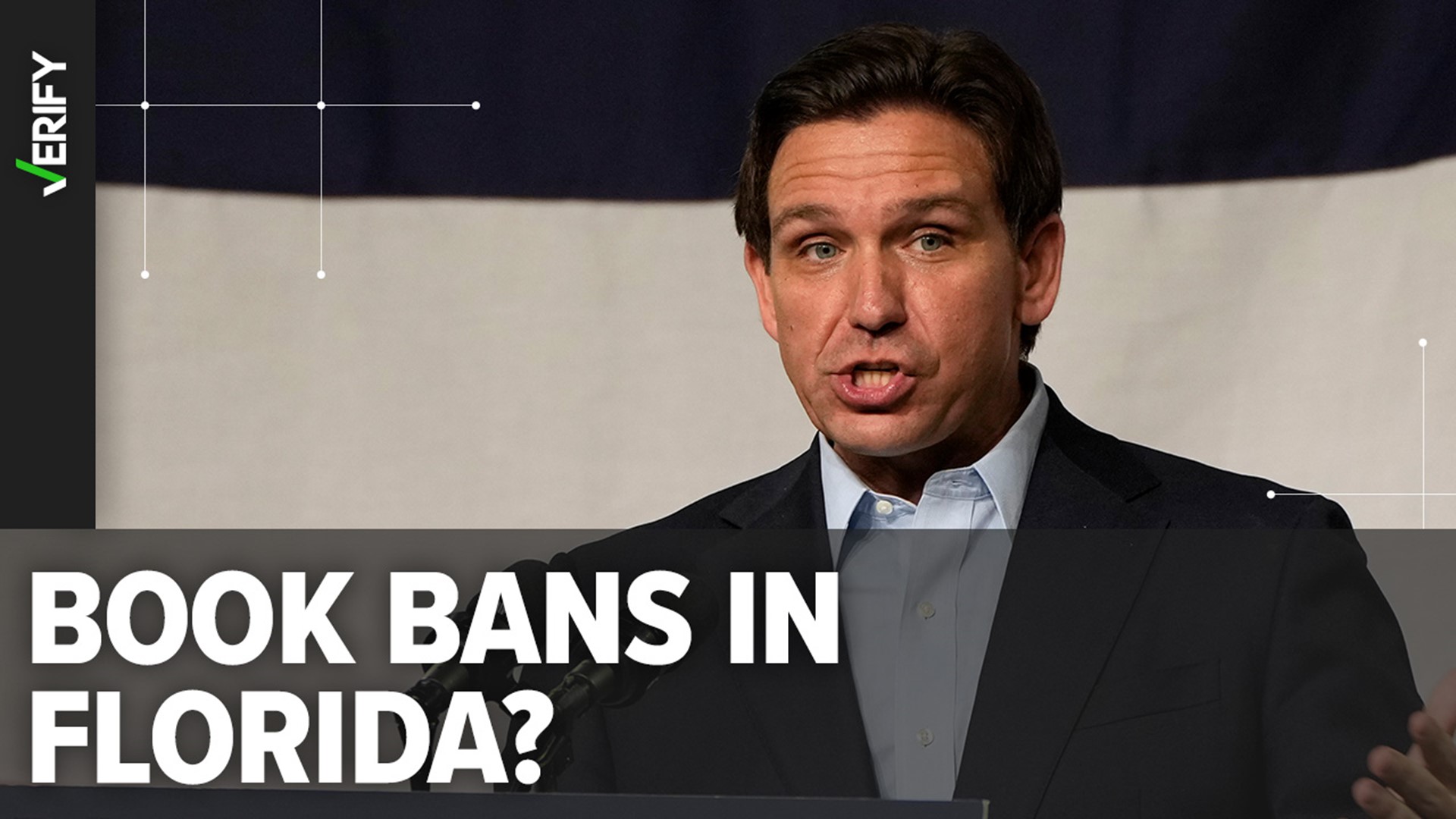On May 24, Republican Florida Gov. Ron DeSantis announced he’s running for president during a livestream on Twitter. During his announcement, he talked about the 2024 race and touched on a number of issues, including book bans in Florida, a controversial topic that has been in headlines recently.
“The whole book ban thing is a hoax. There’s not been a single book banned in the state of Florida. You can go buy or use whatever book you want,” DeSantis said.
After DeSantis’ announcement, California Gov. Gavin Newsom, a Democrat, tweeted: “‘There has not been a single book banned in Florida.’ Last school year, Florida had 566 bans across 21 school districts.”
THE QUESTION
Are there no banned books in Florida, as DeSantis claims?
THE SOURCES
- Middle Tennessee State University’s First Amendment Encyclopedia
- PEN America, a nonprofit organization that defends free expression
- Jeremy Redfern, press secretary for Gov. Ron DeSantis
- Cassie Palelis, press secretary for the Florida Department of Education
- School board policies in Florida’s Miami-Dade, Sarasota, Broward and Lake counties
- American Library Association
- Florida House Bill 1467, which was signed into law in March 2022
- Florida House Bill 1069, which goes into effect July 1, 2023
THE ANSWER
Desantis’ claim is false. There have been hundreds of books banned in different Florida school districts.
WHAT WE FOUND
According to Middle Tennessee State University’s First Amendment Encyclopedia, book banning is defined as a form of censorship that “occurs when private individuals, government officials, or organizations remove books from libraries, school reading lists, or bookstore shelves because they object to their content, ideas, or themes.” Other institutions list similar definitions for book banning.
Under these definitions, there are banned books in Florida.
During the 2021-2022 school year, 566 books were banned across 21 school districts in Florida, according to data tracked by PEN America, a nonprofit organization that defends free expression. Those were the numbers cited in Newsom’s tweet.
There have been 357 books banned during the 2022-2023 school year across 13 school districts, as of May 25, PEN America reports.
The numbers in the PEN America reports represent documented cases of book bans reported directly to PEN America and/or covered in the media. PEN America says “there are likely additional bans that have not been reported.”
The bans were implemented by individual school districts – not by the state. When asked about statewide bans, Jeremy Redfern, a press secretary for DeSantis, told VERIFY in an email, “There are no banned books in Florida.”
Redfern said the governor’s office doesn’t consider books removed from curriculum as banned.
“This is something the governor has explained on multiple occasions, but it apparently doesn’t resonate with the ‘Fact Checkers.’ So, I’ll break it down for you a little bit more: There are no banned books in Florida. Not having a book as part of public school curriculum does not mean that it’s banned. You’re more than welcome to go to a book store and purchase ‘Gender Queer’ for yourself,” Redfern’s email to VERIFY said.
According to the American Library Association, “Gender Queer: A Memoir by Maia Kobabe” was the most challenged book of 2022 across the U.S.; critics opposed its LGBTQIA+ content and claimed the book is sexually explicit.
In Florida, while there are no statewide book bans, HB 1467, which was signed into law in March 2022, requires schools to be more transparent and give parents a chance to have input on selecting library books and other instructional materials.
Cassie Palelis, the press secretary for Florida’s Department of Education, told VERIFY because of those transparency laws, “parents have the right to object to the use of a specific material and districts must have processes in place to address the objections.”
The rules on how each school district handles challenged books must be clearly spelled out in school district board policies, Palelis said.
In several Florida school district policies VERIFY reviewed, a review process starts after a complaint is filed with the school. In Miami-Dade County, for instance, the step-by-step process is outlined in their school board policy.
According to Miami-Dade district’s policy, several committees must meet in order to determine if challenged material can be removed from a school. During the first stage of the review process, the principal, the region superintendent and a district supervisor over library and media services review the material before the complaint is escalated to the district level.
At the district level, the committee consists of administrators, teachers, librarians, students and two representatives from a parent-teacher association.
If the committees recommend the material be removed, it can be removed.
The policy is similar at public schools in Sarasota County, Broward County and Lake County.
The committees can also make other recommendations for challenged material.
The day before DeSantis announced his presidential candidacy, poet Amanda Gorman posted on Instagram that her book "The Hill We Climb" had been removed after one parent complained about its content. After a review, it was determined that the material was better suited for middle school students. It was taken out of circulation in elementary schools, Ana Rhodes, a press secretary for Miami-Dade County Public Schools told VERIFY.
Currently, some school district policies say that challenged material must remain accessible while it’s being reviewed. That process will change on July 1 when HB 1069 goes into effect. The new state law requires material that has been challenged because it is thought to be pornographic or sexual in nature be removed from circulation within five school days of the objection and remain unavailable until the objection is resolved.
Material challenged for other reasons can stay on shelves while it goes through the review process.
On March 24, the State Board of Education approved a new rule that will require the Board to publish an annual list of library books and instruction material that have been removed or discontinued.

